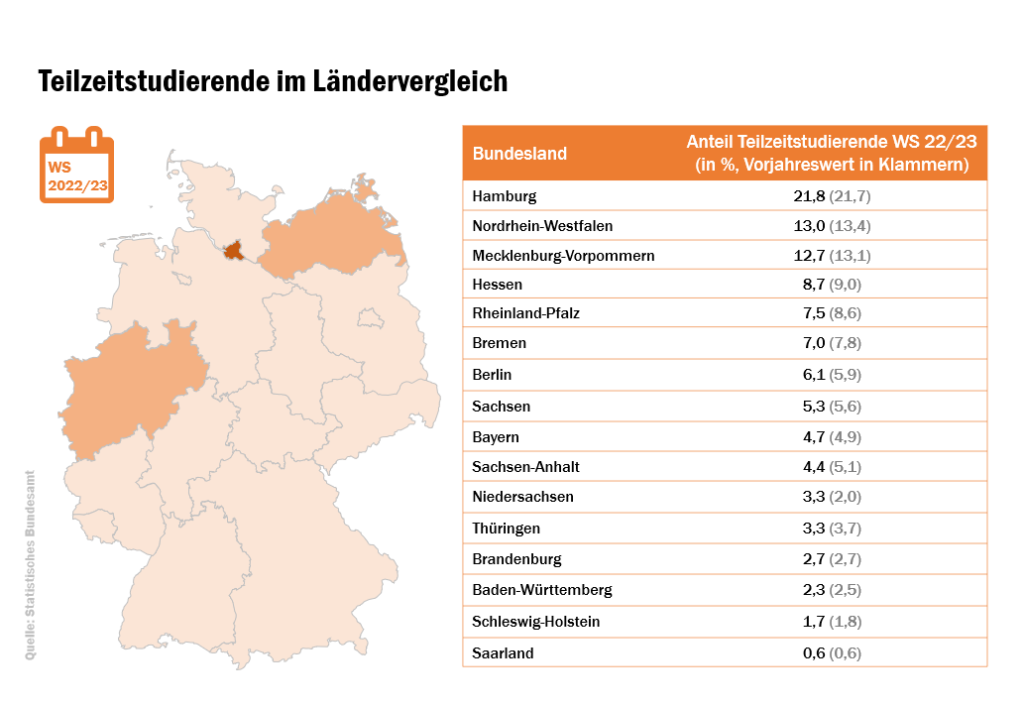
After a recent peak, the number of part-time students in Germany has fallen slightly again. More than half of them are enrolled in private higher education institutions (HEIs). Germany’s federal states with the highest proportions are Hamburg, North Rhine-Westphalia and Mecklenburg-West Pomerania. These are the findings of the annual evaluation carried out by the CHE Centre for Higher Education.
According to the Federal Statistical Office of Germany, around 223,000 people in Germany were officially studying part-time in winter semester 2022/23. This represents a decrease of 7,500 part-time students from the previous year. The proportion of part-time students now stands at 7.6 per cent, and has fallen again for the first time since winter semester 2017/18.
“However, the proportion of students unofficially studying part-time in Germany – taking on a smaller workload and requiring longer to complete their studies – is likely to be much higher. According to the random sample of the 22nd Social Survey, about one in five students declared that they were not studying full-time,” stated Cort-Denis Hachmeister, assessing the different values.
CHE’s analysis by federal state shows that Hamburg has the highest share of part-time students (21.8%). At HEIs in this city-state, around one in five students did not study on a full-time basis. Five HEIs in the Hanseatic city alone, including two distance learning universities, have a proportion of part-time students exceeding 20 per cent. North Rhine-Westphalia (13.0%) and Mecklenburg-Western Pomerania (12.7%) also recorded double-digit rates. Saarland is Germany’s federal state with the smallest part-time student population (of around 200) and the lowest proportion of part-time students (0.6%).

CHE’s annual analysis highlights the great importance of private HEIs in this context. More than half of all part-time students are now enrolled in private institutions.
A small number of HEIs are particularly attractive to students who are unable or unwilling to study full-time. 48 per cent of all part-time students are enrolled either at a campus of the private FOM Hochschule für Oekonomie & Management, the state-run FernUniversität in Hagen, or the private Hamburger Fern-Hochschule.
“On paper, part-time courses are available to students, with around one in five programmes currently available on a part-time basis,” commented Cort-Denis Hachmeister. “In Germany, however, this option always involves a certain amount of effort. This is either a financial burden in the form of tuition fees at a private HEI, or the corresponding bureaucratic obligation to provide proof of eligibility for part-time study at a state HEI,” explained the author of the study.
There is still a lack of flexible degree programmes at state HEIs that students can take in a pragmatic and uncomplicated way, such as in the event of family responsibilities.
This is exacerbated by the continuing funding gap in student financing. Moreover, students who do not want to lose their entitlement to a BAföG grant are not even officially allowed to study part-time – an issue that the Federal Government should address quickly by reforming the BAföG (Federal Law on Support for Education and Training), which CHE believes is long overdue.
About the study:
On behalf of the CHE Centre for Higher Education, CHE Consult has been analysing the development of part-time study options in Germany since 2016. The publication entitled “CHECK – Teilzeitstudium in Deutschland 2023” (CHECK – Part-time study in Germany 2023) includes degree programmes offered by HEIs and student demand for part-time programmes. The proportion of part-time programmes on offer is based on data contained in the Higher Education Compass provided by the German Rectors’ Conference for winter semester 2022/23. The percentages of part-time students are based on information provided by the Federal Statistical Office of Germany for winter semester 2022/23. Key information about the topic, checklists and an annotated list of links are available at the following link.
CHECK – Teilzeitstudium in Deutschland 2023 2. November 2023 3.45 MB 13273 downloads
Hachmeister, Cort-Denis; Gehlke, Anna; Hill, Lukasz: CHECK - Teilzeitstudium in Deutschland...
Bildquelle: Pixabay | Montage: CHE
